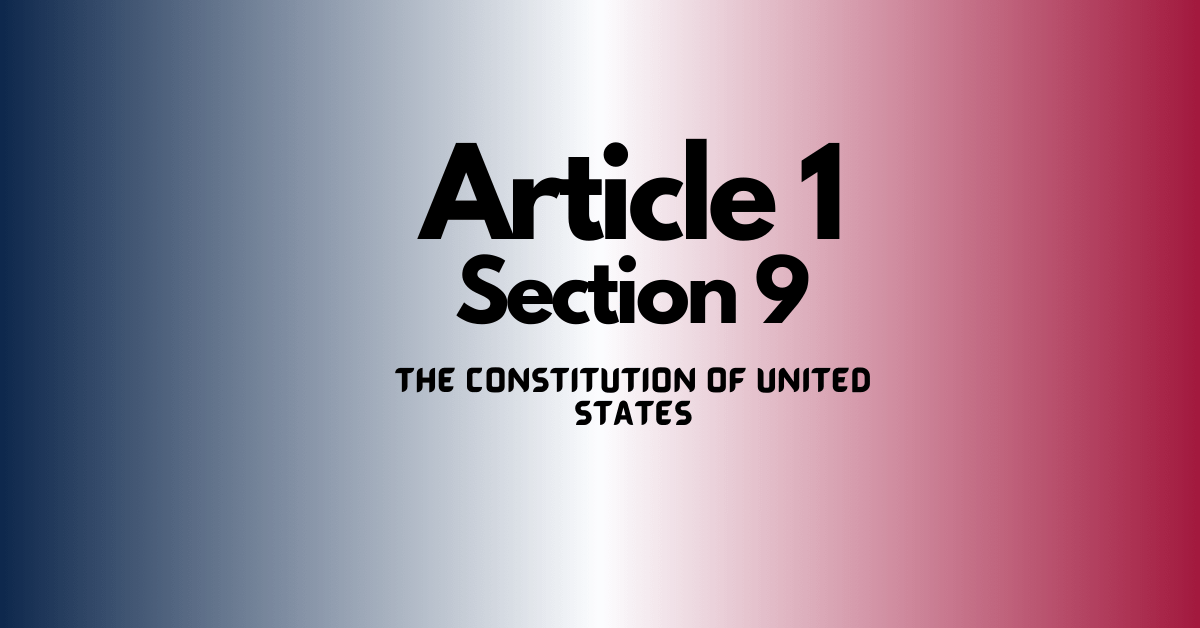Article 1 , Section 9 (Original text):
The Migration or Importation of such Persons as any of the States now existing shall think proper to admit, shall not be prohibited by the Congress prior to the Year one thousand eight hundred and eight, but a Tax or duty may be imposed on such Importation, not exceeding ten dollars for each Person.
The Privilege of the Writ of Habeas Corpus shall not be suspended, unless when in Cases of Rebellion or Invasion the public Safety may require it.
No Bill of Attainder or ex post facto Law shall be passed.
[No Capitation, or other direct, Tax shall be laid, unless in Proportion to the Census or Enumeration herein before directed to be taken.]
No Tax or Duty shall be laid on Articles exported from any State
No Preference shall be given by any Regulation of Commerce or Revenue to the Ports of one State over those of another: nor shall Vessels bound to, or from, one State, be obliged to enter, clear, or pay Duties in another.
No Money shall be drawn from the Treasury, but in Consequence of Appropriations made by Law; and a regular Statement and Account of the Receipts and Expenditures of all public Money shall be published from time to time.
No Title of Nobility shall be granted by the United States: And no Person holding any Office of Profit or Trust under them, shall, without the Consent of the Congress, accept of any present, Emolument, Office, or Title, of any kind whatever, from any King, Prince, or foreign State.
Explanation:
This section of the Constitution outlines various prohibitions and limitations placed on Congress to protect individual rights, prevent abuse of power, and ensure transparency and accountability in government finances.
Prohibitions and Limitations
- Importation of Persons:
- Congress cannot prohibit the migration or importation of persons, as agreed upon by existing states, until the year 1808. However, a tax or duty not exceeding ten dollars per person may be imposed.
- Habeas Corpus:
- The privilege of the writ of Habeas Corpus cannot be suspended, except in cases of rebellion or invasion when public safety necessitates it.
- Bills of Attainder and Ex Post Facto Laws:
- Congress cannot pass bills of attainder or ex post facto laws.
- Direct Taxes:
- No capitation or other direct tax can be laid unless it is in proportion to the census or enumeration directed to be taken.
- Export Taxes:
- No tax or duty can be imposed on articles exported from any state.
- Regulation of Commerce:
- No preference can be given to any state’s ports over those of another, nor can vessels bound to or from one state be obligated to enter, clear, or pay duties in another state.
- Treasury Funds:
- Money cannot be withdrawn from the Treasury except as a result of appropriations made by law. Additionally, a regular statement and account of all public money receipts and expenditures must be published periodically.
- Titles of Nobility and Foreign Gifts:
- The United States cannot grant titles of nobility, and no person holding any office of profit or trust under the United States can accept any present, emolument, office, or title from any king, prince, or foreign state without the consent of Congress.
FEEL FREE TO ASK DOUBTS IN THE COMMENTS.
